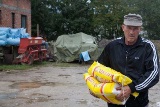Since the COVID-19 pandemic, there has been an increased interest and demand for land and rural living in Mokro, indicating opportunities for the development of agriculture and rural tourism. In relation to that, the local community is especially interested in developing organic farming, medicinal plant cultivation, forest fruit processing, and beekeeping. Aligning with strategic plans, the Agriculture Development Strategy and Rural Tourism Development Plan set clear objectives for progress by 2027. In the realm of agriculture digitalization, entrepreneurial initiatives on small farms have flourished, leveraging online channels for product sales. Social networks, notably Viber and Facebook, have become vital for information exchange and sales, with women, exemplified by the "Kutak za Dame" Facebook group, playing a key role in marketing and sales.
Challenges
Deforestation poses a significant environmental challenge in Mokro, with the village associated with intensive deforestation. It is worth noting that deforestation not only threatens the preservation of natural resources but also poses a potential detriment to the potential development of the agri- and rural tourism sector, as the scenic and ecological aspects integral to tourism may be adversely affected by the depletion of the local forested areas.
While many individuals use smartphones, only a small number of citizens employ digital devices in the agriculture sector. The absence of training programmes for advanced digital skills in agriculture further exacerbates this situation, and positive practices in utilizing digital technologies for the agricultural sector are not adequately promoted. While the community has embraced mobile technology for basic functions, the utilization of more sophisticated tools in productive activities is infrequent. This contributes to the low competitiveness of the local agriculture sector.
Small agricultural farms predominate, facing challenges such as low yields in crop and livestock production, the predominant use of traditional technology, and inadequate financial investments. There are no farmer associations or cooperatives uniting small agricultural producers commercially, and farmers predominantly operate independently in the market.
Despite a few positive examples, there is a notable lack of entrepreneurial initiatives by citizens, and continuous programs to support entrepreneurship and innovation, particularly in rural areas, are absent. The untapped potential of traditional agricultural and homemade products further underscores the underdeveloped nature of this aspect. While local development plans recognize tourism, including rural and agrotourism, as a viable opportunity, tangible entrepreneurial initiatives in this direction are yet to materialize.
Rural and agri-tourism sector in Mokro, acknowledged for its significant potential, is still considered underdeveloped. An inadequate promotion of renowned traditional local products, a lack of organized efforts, and the absence of sectoral associations characterize its current state. Despite the village's advantageous geographical location, endeavors to improve the production, sale, and promotion of local products face hindrances due to these challenges.
Highlights

In Bosnia and Herzegovina, FAO upscales support to agricultural and rural development planning
12/04/2022
FAO launched a new initiative in Bosnia and Herzegovina to help selected local authorities boost agriculture and economic development through local agriculture and rural development plans and corresponding action plans.

Digital village hubs can transform quality of life in rural Europe and Central Asia
18/05/2023
In 2021, the Food and Agriculture Organization of the United Nation (FAO) launched the global Digital Villages Initiative to promote digital innovations to rural communities.
Video
Digital Villages in Action in Europe and Central Asia: Focus on Bosnia and Herzegovina
10/01/2024
Digital Villages in Action in Europe and Central Asia virtual event launched DVI actions in eight countries, bringing together policy actors, stakeholders, partners, and beneficiaries. Grujica Vico, National Digital Villages Specialist of FAO Bosnia and Herzegovina discussed the country’s progress and plans for the introduction of DVI.

